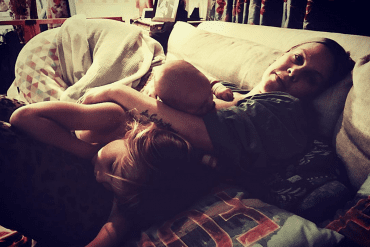By Lucy Ruddle
When I was a first-time mum to my now seven-year-old, I watched as a midwife sucked in her breath while she wrote down my baby’s day 5 weight. I knew something bad was coming but I wasn’t sure what. Turns out I still did not really know what it was after she told me. “You need to do some triple feeding – get that weight up just a little bit more” she said, with an air of such casualness that I was certain I had missed something obvious.
“Sorry, what?” I asked.
“Oh, just pump after you breastfeed and top baby up with what you get.” And with that she was off, smiling and telling me that I was doing just great as she picked up her bags and closed the door behind her.
Anyone who has been through the hell of triple feeding will know that while on the surface it is as simple as “pump and top up”, the reality is that it is incredibly time consuming, rife with supply worries, and ultimately tricky to recover from without some good support.
I did not have the good support – and by the time he was 2 weeks old, my little boy was exclusively formula fed.
That was seven years ago now and ever since then I have been on a personal crusade to improve breastfeeding support and the accessibility of information for everyone who needs it. Triple feeding absolutely falls into that category, with parents having many questions about why, how, and the biggest of all – how to STOP the endless cycle of latching, pumping, bottle feeding, washing up, and starting all over again. With all of that in mind, lets break it down:
Why
Triple feeding is an intervention often brought in due to weight gain challenges in the early days of breastfeeding. It works to ensure baby is well fed while the additional stimulation helps mum’s milk supply to increase / maintain as needed. This is a sound theory, and it usually works fairly well. HOWEVER, if we are not also addressing the REASON for baby’s slow weight gain then we are unlikely to get to a point where the top ups can be stopped.
So, the first thing to do is find someone professionally qualified to assess your baby’s feeding at the breast. Ideally an IBCLC or a breastfeeding specialist.
This person should want to watch a full feed count swallows, check the latch, and help you to make changes if needed. The number one cause of weight gain challenges is something being “off” with latching. We have GOT to make sure the latch is spot on before we begin jumping into rabbit holes about chronic low supply caused by maternal anatomy or hormones.
I see about 15 families a week for breastfeeding support, many with slow weight gain, and it is exceedingly rare for me to see a “textbook” latch. Once we help mum and baby get that working more effectively, we immediately see more swallowing and a happier baby. (And happier parents!)
How
This is often one of the biggest challenges to triple feeding – how on Earth do we do this? You’ve got a newborn, your partner might be back at work, maybe you’ve got a toddler as well, or you’re trying to keep a business ticking over. Maybe you are recovering physically from birth, or you just feel your insides whither up and die a little every time you have to sit there with a breast pump attached to your boobs. In theory, you should be pumping for about 10 minutes once baby has finished at the breast. But babies don’t really care about pumping schedules, so you might need to be more flexible. My top tips for managing triple feeding are:
- Keep your pump set up and somewhere you often are. If you can squeeze in 5 minutes every time you sit down or walk past the pump you will be doing wonders for your supply!
- Buy extra pump parts so you do not have to wash up after every pumping session. I had 3 on rotation, meaning my husband could wash everything up for me before and after work, and in the day, I could just chuck the used bits in the sink and grab the clean set.
- Understand that being rigid will not work. Your baby needs you. It is ok to settle baby or enjoy some snuggles before trying to pump. Sometimes you will miss entire sessions. Do not panic. The more pressure you put yourself under the more likely you are to feel that the whole thing is not sustainable.
- Do not feel guilty if older children watch more TV than usual, or if you live off of takeaways, crisps, and chunks of cheese. This is temporary. Be kind to yourself and lower your expectations.
- Ask for help. It is amazing how many people will volunteer to come and cuddle your baby while you pump for a few minutes. The really good people will bring cake with them.











